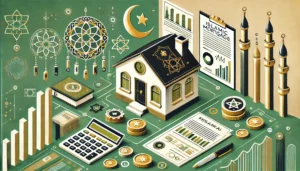Islamic mortgages are for Muslims who want to buy a home without breaking the Sharia law rule against interest (riba). They don’t work like traditional mortgages. Key structures include Murabaha, where the bank sells the property to the buyer at a markup; Ijara, a lease-to-own option that ends in full ownership; and Musharaka, where the bank and the buyer jointly own the property, and the buyer gradually buys the bank’s share.
Yet these mortgages present challenges, including higher costs, less availability, and negotiating documentation. However, they offer faith compliance, transparency, and ethical investing. Islamic mortgages are expected to become more widespread as the demand for Sharia-compliant financial products grows, allowing Muslims to buy homes that perfectly align with their values.
What Are Islamic Mortgages?
Part of the reason for the difference is that, unlike conventional mortgages, Islamic mortgages are structured to rely on profit and risk sharing rather than interest-based lending. They also align with Islamic finance principles, including ethical and socially responsible investment. How does an Islamic mortgage work?
How Do Islamic Mortgages Work?
There are several Islamic mortgage structures designed to escape interest, but at the same time, the designed mortgage structure must be accessible for home financing. The most common types include:
- Murabaha (Cost-Plus Financing):
Murabaha is a bank arrangement in which the bank purchases the property for the customer and then sells it to the customer at a marked-up price. The buyer pays these amounts in fixed installments over a given period. The bank shows the profit margin upfront, so there’s no mystery about what it pays. - Ijara (Lease-to-Own):
In an Ijara structure, the bank buys the property and leases it to the buyer for a set period. The buyer pays the bank rent, and part of the payments goes to future property ownership. At the end of the lease term, the buyer takes ownership of the property entirely. - Musharaka (Diminishing Partnership):
Musharaka (buyers and the bank jointly purchase property). The buyer pays rent on the remainder and, with periodic payments, slowly buys out the bank’s interest. Ownership is transferred to the buyer only after all costs are complete.
Benefits of Islamic Mortgages
- Faith Compliance: Islamic mortgages allow Muslims to get a home without violating Sharia principles.
- Transparency: Islamic mortgages usually have unambiguous and straightforward terms and conditions to build trust between the buyer and the financial institution.
- Ethical Investment: Islamic financial institutions always engage in socially responsible investing, as the funds are to be used consistently with moral values.
Challenges and Considerations
While Islamic mortgages offer significant benefits, they also come with specific challenges, such as:
- Higher Costs: Islamic mortgages can sometimes command some fat profit margins, even more so than conventional loans.
- Limited Availability: Islamic mortgages are not as widely available as traditional mortgages, especially in most countries.
- Complex Documentation: Islamic mortgages can be more complicated legally and financially, requiring a complete understanding.
Demand for This Industry will increase in the Future.
As Islamic finance permeates the public mind, so does the demand for Islamic-compliant financial products. In different countries, governments and financial institutions are launching policies and programs to foster Islamic mortgages so Muslim communities worldwide can access them.
Conclusion
Muslims who want to own a home while maintaining their faith need Islamic mortgages as their primary financial tool. While not everyone may understand how these products work, the goal is to help prospective buyers make the right choice, one aligned with their faith and financial goals, by understanding how these products work and their unique benefits. Thanks to ongoing innovative measures and support from financial institutions, Islamic mortgages are destined to become a more significant part of the global housing market.


